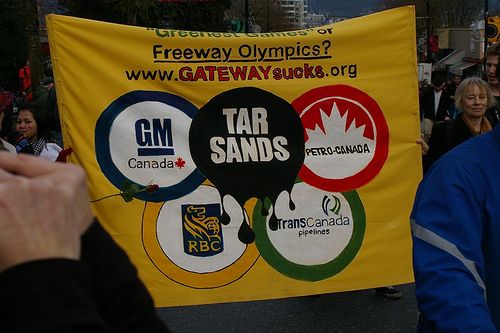2010 Protesters: Police had better be peaceful...
2010 Protesters: Police Had Better Be Peaceful....
2010 protesters say police must keep the peace
CTV/The Canadian Press, Monday Feb. 8, 2010
http://www.ctvbc.ctv.ca/servlet/an/local/CTVNews/20100208/bc_olympic_pro...
Police are expecting large crowds of protesters to mark the start of the Winter Games later this week, but international Olympic officials say they're not concerned the demonstrations will pose any serious problems.
Anti-Olympic groups are planning a large event in downtown Vancouver to coincide with Friday's opening ceremonies, and others are expected to follow throughout the ensuing 16 days of the Games.
Vancouver police have recently said they expect between 1,000 and 1,500 protesters in the first few days of the Olympics -- a significantly larger number than many had previously expected -- and protest organizers say they hope to exceed those figures.
But officials with the International Olympic Committee and the local organizing committee, known as VANOC, said they were confident protests will be peaceful and won't cause any major disruptions during the Games.
Gerhard Heiberg, a member of the IOC's executive board, said the committee has always been aware of the potential for protests during the Vancouver Olympics.
"I wouldn't call it concerns," Heiberg, who was also the chairman of the committee that evaluated Vancouver's bid for the Games in 2003, said at a news conference Monday.
"We have to accept protests and there will be some and fine, let's leave it. We are used to that."
The IOC raised the issue of protests with VANOC during a final briefing on Monday, but Heiberg said he was curious -- rather than concerned -- about what will happen.
Several protest organizers held their own news conference on Monday, saying they hope everyone from activist groups to union members to disaffected members of the public show up out to denounce the Games.
"I hope thousands of them come out if the press stops scaring people talking about the possibility of violence," said Bob Ages of the Council of Canadians. "I think it could be really big."
Police have insisted they will respect protesters' right to free speech, so long as they don't break the law or interfere with the rights of anyone else.
However, Olympic critics have complained the RCMP-led unit overseeing Olympic security has harassed activists by approaching them on the street and speaking with their neighbours and members of their families.
They also complain that protesters from outside the country have been stopped or questioned at the border, most recently this past weekend when Martin Macias Jr., an American who led a group opposed to Chicago's bid for the 2016 Games, was denied entry into Canada.
"The police have worked really hard to intimidate and discourage people from expressing themselves, so I hope they will be brave come the Olympics and realize we have nothing to fear if we have the numbers," said Alissa Westergard-Thorpe of the Olympic Resistance Movement.
The protest organizers said it will be up to the police, not them, to ensure protests remain peaceful.
For their part, police said they will set up so-called "safe assembly" areas for protests, rather than try to stop them.
The idea of creating areas where protesters could demonstrate safely was a key recommendation in a report into the 1997 APEC protests in Vancouver, when demonstrators were pepper sprayed, detained and strip searched. The event remains a stain on the reputation of the RCMP.
Protesters, however, have vowed not to use any area that police officially designated as a protest zone.
Friday's protest is planned for a lawn outside the Vancouver Art Gallery, a traditional demonstration space that Vancouver police said they plan to leave alone during the Olympics.
Westergard-Thorpe said anti-Olympic protesters don't plan to be violent.
"There's never been any violence associated with an anti-Olympic protest -- property damage that you might see in some cases is not violence," she said.
